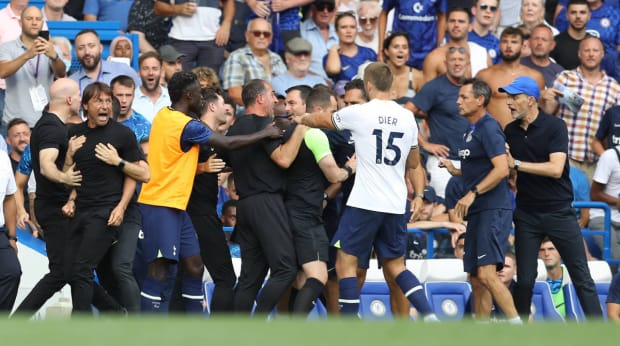A postgame confrontation between two tactical masterminds put the cherry on top of an entertaining match already filled with so much drama.
View the original article to see embedded media.
Let’s start at the end. Antonio Conte, a couple of minutes after concluding the second-half triptych of escalating goal celebrations with a wildly violent dance, walked toward Thomas Tuchel and shook his hand. But he did so, Tuchel said, without looking him in the eye and so the Chelsea manager did not release his hand, jerking Conte back to face him. As both held on, at this point furiously eyeballing each other, Tuchel raised two fingers to his own eyes, indicating his objection. Both managers had already been booked, and, as players and coaching staff waded in, both were given red cards.
By the time both spoke to the media, both had calmed down. Both seemed to have enjoyed it—although Conte’s celebrations were perhaps tinged by a sense that he still has a point to prove to Chelsea given the circumstance of his departure from Stamford Bridge in 2018. There were no jibes about respect or anything else. Both, in fact, seemed to have relished the competitiveness of a thoroughly entertaining afternoon.
On a sultry London afternoon, the air thick after weeks of drought, Chelsea and Tottenham had produced a 2–2 draw and a game that was the very best of the Premier League. English football has always had anger and tension and energy, but now it has the very best managers in the world, and so there is also a tactical master class underpinning it all.
Tuchel will feel that in that regard he came out on top. Chelsea was much the better side in the first half and marginally the better in the second, for all that the introduction of Richarlison disrupted Chelsea’s defensive pattern. There were encouraging signs for the home side in the way the movement of Raheem Sterling stretched the Spurs defense. This was far more like the Chelsea that won the Champions League than the disjointed team of the end of last season.
But yet again it did not take full advantage and needed defenders to score its goals. And that, perhaps, was what led to the degree of frustration at the two equalizers it conceded. Both, it’s true, require some unpacking. Rodrigo Bentancur probably did foul Kai Havertz 45 seconds before the first equalizer, although from the camera angle that most closely approximated the view of the referee Anthony Taylor, that was not obvious.

Paul Terry/Sportimage/Imago Images
Could VAR have intervened after Pierre-Emile Højbjerg had scored? Possibly, although 45 seconds is a long time to go back. More serious, although it oddly seemed to attract far less attention, was the fact that his shot scooted by Richarlison, who was in an offside position, on its way in. Was he directly in Édouard Mendy’s eyeline, which appears to be how the law is now interpreted? Perhaps not, but Mendy was looking to the left of Richarlison and the ball went to the right; that must have an impact on his reaction and for that reason the goal probably should have been ruled out.
There is an online constituency of Chelsea fans convinced Taylor is biased against them. Tuchel admitted after the game that he has a problem with the official. This is one of the more depressing aspects of the modern game, of modern life. Contentious decisions happen. Football is not black and white. If there was blame here, it was not with Taylor but with VAR.
The same was true of the second goal. Cristian Romero did pull Marc Cucurella’s hair. In 2016 Robert Huth received a retrospective three-game ban for pulling Marouane Fellaini’s hair, which would imply that hair-pulling is considered violent conduct. In a crowded box, his view obscured by Romero’s body, can Taylor really be blamed for missing it? Not really, which is why VAR should have taken action. Unless a goal is scored, though, VAR can intervene only if the offense is worthy of a red card, and VAR official Mike Dean presumably reasoned that, in that regard, there had been no clear and obvious offense. That is debatable, but it is not Taylor’s fault.
It was from the subsequent corner that Harry Kane headed in to make it 2–2, a rare case of Tottenham dragging itself back into a game and getting more than it perhaps deserved. Whether that is a result of a new mentality instilled by Conte will become apparent only with time, but after four defeats in four games against Chelsea last season, a point represents progress.
So Chelsea played well, Tottenham battled back, the tension and drama fizzed throughout. It was a perfect way for the Premier League to celebrate its 30th birthday, let down by only the tiresome cries of bias from fans when decisions sometimes don’t go their way.
More Soccer Coverage: